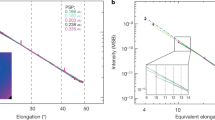Abstract
IN view of the recently published measurements made at Princeton University of the oblateness of the solar disk, it is interesting to note that the apparent flattening caused by the terrestrial atmosphere is significant even at high elevations. A short computer programme was used to calculate the degree of flattening caused by a standard atmosphere above a flat Earth, assuming a solar diameter of 32 min arc. The results are given graphically in Fig. 1, in which the degree of flattening is measured in terms of the apparent major diameter. Table 1 relates these results to particular observing times at latitude +40°, showing that the effect can be considerably larger during the reported observation period than the actual measured oblateness of fifty parts in 106. The effect could be substantially eliminated by forming the image of the disk in a vacuum behind a horizontal air–vacuum interface.
This is a preview of subscription content, access via your institution
Access options
Subscribe to this journal
Receive 51 print issues and online access
$199.00 per year
only $3.90 per issue
Buy this article
- Purchase on Springer Link
- Instant access to full article PDF
Prices may be subject to local taxes which are calculated during checkout
Similar content being viewed by others
Author information
Authors and Affiliations
Rights and permissions
About this article
Cite this article
CRIBBENS, A. Atmospheric Flattening of the Solar Disk. Nature 214, 1316–1317 (1967). https://doi.org/10.1038/2141316a0
Received:
Issue Date:
DOI: https://doi.org/10.1038/2141316a0
Comments
By submitting a comment you agree to abide by our Terms and Community Guidelines. If you find something abusive or that does not comply with our terms or guidelines please flag it as inappropriate.



